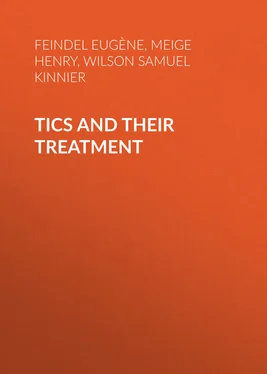Henry Meige - Tics and Their Treatment
Здесь есть возможность читать онлайн «Henry Meige - Tics and Their Treatment» — ознакомительный отрывок электронной книги совершенно бесплатно, а после прочтения отрывка купить полную версию. В некоторых случаях можно слушать аудио, скачать через торрент в формате fb2 и присутствует краткое содержание. Жанр: Здоровье, Медицина, foreign_antique, foreign_language, на английском языке. Описание произведения, (предисловие) а так же отзывы посетителей доступны на портале библиотеки ЛибКат.
- Название:Tics and Their Treatment
- Автор:
- Жанр:
- Год:неизвестен
- ISBN:нет данных
- Рейтинг книги:4 / 5. Голосов: 1
-
Избранное:Добавить в избранное
- Отзывы:
-
Ваша оценка:
- 80
- 1
- 2
- 3
- 4
- 5
Tics and Their Treatment: краткое содержание, описание и аннотация
Предлагаем к чтению аннотацию, описание, краткое содержание или предисловие (зависит от того, что написал сам автор книги «Tics and Their Treatment»). Если вы не нашли необходимую информацию о книге — напишите в комментариях, мы постараемся отыскать её.
Tics and Their Treatment — читать онлайн ознакомительный отрывок
Ниже представлен текст книги, разбитый по страницам. Система сохранения места последней прочитанной страницы, позволяет с удобством читать онлайн бесплатно книгу «Tics and Their Treatment», без необходимости каждый раз заново искать на чём Вы остановились. Поставьте закладку, и сможете в любой момент перейти на страницу, на которой закончили чтение.
Интервал:
Закладка:
The insight into the close association between the state of the mind and the development of tic yielded by a study of the foregoing narrative will enable us to appreciate the perspicacity of what follows:
I suppose that we who tic make a great number of voluntary movements with the deliberate purpose of withdrawing attention from the tics we already exhibit; but step by step they become so habitual that they are nothing less than fresh tics appended to the old. To dissemble one tic we fashion another.
Certain objects become for us what might be called para-tics . Such, for an instance, is my hat. I used to imagine I could mask all my oddities by tilting it on my head. I used to carry it in my hand, and play with it in every conceivable manner – to the advantage of the hatter solely, for it did not last me more than six weeks… We are our own physicians at first: the discomfort of a tic is an urgent reason for our seeking to compass its overthrow.
For years it was O.'s custom when out walking to clasp his hands behind his back, bend his body forward, and hold his chin in the air, and this habit explains his attitude tic of to-day. The ludicrousness of it was early impressed on him, but instead of adopting the obvious solution of the difficulty, he proceeded to devise a whole series of intricate measures to regain the correct position – measures which he picturesquely names para-tics . At first he used the curved handle of his cane to pull on the brim of his hat, and so depress his head; a subsequent modification consisted in putting the cane under his chin and pressing down on it. Each of these subterfuges attained a degree of success, and that in spite of the fact that in one case the extensors, and in the other the flexors, of the head were being resisted: in other words, each was efficacious so long as O. chose to consider it so.
Eventually their serviceableness dwindled, and O. conceived the plan of slipping his cane between his jacket and his buttoned overcoat so that the chin might find support against its knob. In the movements of walking, however, contact between the two was never maintained – each was for ever seeking the whereabouts of the other; and while it mattered little that this incessant groping and jockeying wore out several suits and the lining of several overcoats, the more serious result was the acquisition on O.'s part of the habit of making various up-and-down and side-to-side movements of his head, which continued to assert themselves, though chin and cane were no more in proximity.
It was not long ere the ceaseless intrusion of his head tics drove him every moment in search of a support for his chin. To read or write he was forced to rest it on a finger, or on his fist, or hold it between two fingers, or with his open hand, or with two hands, although the distraction provided by a serious occupation sufficed to banish the impulse and stay the tics.
A day came when application of the hand no longer seemed calculated to ensure immobility of the head, whereupon he hit on the idea of sitting astride a chair and propping his chin against it. This idea had its day, and the next move was to press his nose against one end of the chair back. Each successive stratagem was of marvellous promise at the outset, but its inhibitory value rapidly deteriorated and new plans were concocted.
All schemes for fixation lose their virtue through time, but they may be abandoned for other reasons, one of the principal of which is the development of pain. By dint of rubbing or pressing his nose or his chin on the knob of his cane and the back of his chair, O. has produced little excoriations and sores on the parts concerned, the pain of which acts as a deterrent, but his tics and para-tics break out afresh whenever it has gone. The game has been carried to such an extent that under the chin and at the root of the nose there have appeared actual corns – strange stigmata of one's "profession."
The details in the mental process are similar to what has been already noted:
It was the craving to keep my head in a correct position that induced the habit of leaning my chin on something, and I found it essential to feel the contact; familiarity, however, soon ended in my failing to perceive it, and a new movement was made that I might experience the sensation once more. And so on the ball rolled, till augmentation of the force I exerted, under a constant incitement to feel something more or something else, resulted in the formation of callosities on nose and chin.
In this way factitious wants come into being, which may be described as a sort of parasitic function of which the patient is alike the creator and the dupe.
O.'s therapeutic ingenuity, however, could not rest satisfied except when some fresh contrivance was being put to the test. Needless to say, at one time he experimented with the stiff collars affected by some sufferers from mental torticollis.
At the commencement I used to wear collars of medium height, though not wide enough to admit my chin. An attempt to obviate the difficulty by unbuttoning my shirt and bending my head down so as to keep my chin in the opening proved abortive, owing to the weakness of the resistance, so I purchased much higher and suffer ones, in which I buried my lower jaw and prevented its moving at all. The success of this method was transitory, nevertheless, for however stiffly they were starched, the collars invariably yielded in the end and presented a lamentable aspect. I next happened on the fatuous plan of attaching a string to my brace buttons, and passing it up under my waistcoat to connect it with a little ivory plate that I held between my teeth, its length being so arranged that in order to seize the plate I had to lower my head. Admirable idea! I soon was forced to abandon it, however, for my trousers were pulled up on the right in a way that was as grotesque as it was uncomfortable. I have always had a weakness for the principle of the thing, nevertheless, and even to-day as I go down the street I sometimes catch hold of the collar of my jacket or vest with my teeth and stroll along in this way. At home it is the collar of my shirt that acts as my tether.
The retrocollic attitude that O. favours seems to have had the further effect of making him forget how to look down. There is no impairment of any of the eye movements, but he has considerable trouble in directing his gaze downwards, and if with his head in the normal position he holds a book below the level of the plane of his eyes, reading is more arduous, and after a little time impossible. Yet there is no indication whatever of ocular paresis; it is rather a sort of apprehension from which he suffers. On several occasions we have remarked a synergy of function, head and eyes moving upward in unison.
Our patient's category of tics is not yet exhausted, however. He has been afflicted with a shoulder tic, consisting of simultaneous or alternate elevation, sometimes of other movements, and always with some abduction of the arms. Frequent execution of these actions has culminated in the acquisition of the faculty of voluntarily producing a rather loud "crack" in the shoulder articulations, which thus not merely originated in a tic, but supplies an ever-active stimulus for its reproduction; in its occurrence satisfaction and dissatisfaction are blended as before. At the present moment the impulse to this particular tic is in abeyance, and he has ceased to take any interest in the "crack," considering it a trivial society accomplishment of no significance or danger, analogous to voluntary subluxation of the thumb, or to the curious sounds that some people are fond of making by way of diversion.
Again, O. has been a martyr to a leg tic of several months' duration. When he was on his feet, he learned to strike his right heel against his left ankle, wearing his trouser through in no time, and ceasing only with the development of a painful wound over the bone. Once it was healed, however, came the deliberate search for the sensation again, and the pleasurable feeling in its rediscovery.
Читать дальшеИнтервал:
Закладка:
Похожие книги на «Tics and Their Treatment»
Представляем Вашему вниманию похожие книги на «Tics and Their Treatment» списком для выбора. Мы отобрали схожую по названию и смыслу литературу в надежде предоставить читателям больше вариантов отыскать новые, интересные, ещё непрочитанные произведения.
Обсуждение, отзывы о книге «Tics and Their Treatment» и просто собственные мнения читателей. Оставьте ваши комментарии, напишите, что Вы думаете о произведении, его смысле или главных героях. Укажите что конкретно понравилось, а что нет, и почему Вы так считаете.












